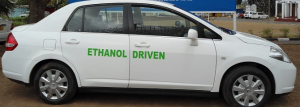 The Ethanol Driven Vehicle Project (EDVP) was initiated in 2006 after a cabinet directive in 2004 that Malawi should explore other sources of fuel for vehicles with the overall objective of contributing to economic development by promoting use of ethanol as an alternative energy source in vehicles. The project was first implemented by the then Department of Science and Technology under the Ministry of Education, Science and Technology and from July 2010 the project was taken over by the National Commission for Science and Technology (NCST). The project was implemented in collaboration with Lilongwe Technical College, Ethanol Company Limited, Malawi Energy Regulatory Authority, Plant and Vehicle Hire Organisation and Malawi Bureau of Standards. PVHO donated an old Mitsubishi Pajero to the project; ETHCO imported a flexi vehicle (Ford Ecosport) and the project bought three Nissan Tiidas.
The Ethanol Driven Vehicle Project (EDVP) was initiated in 2006 after a cabinet directive in 2004 that Malawi should explore other sources of fuel for vehicles with the overall objective of contributing to economic development by promoting use of ethanol as an alternative energy source in vehicles. The project was first implemented by the then Department of Science and Technology under the Ministry of Education, Science and Technology and from July 2010 the project was taken over by the National Commission for Science and Technology (NCST). The project was implemented in collaboration with Lilongwe Technical College, Ethanol Company Limited, Malawi Energy Regulatory Authority, Plant and Vehicle Hire Organisation and Malawi Bureau of Standards. PVHO donated an old Mitsubishi Pajero to the project; ETHCO imported a flexi vehicle (Ford Ecosport) and the project bought three Nissan Tiidas.
By promoting use of ethanol as an alternative energy source in motor vehicles in Malawi, the research findings were aimed at contributing to energy self-sufficiency, national economic development and environmental protection. The use of locally produced ethanol could replace a certain proportion of petrol imported resulting in savings in foreign exchange and reduce the reliance on imported petroleum fuel. Ethanol produced from sugarcane molasses is classified as a renewable form of energy. The use of ethanol reduces emissions of greenhouse gases, carbon monoxide (CO), hydrocarbons (HC), sulphur dioxide (SO2) and particulate matter and ethanol is generally less toxic to handle than petroleum fuels.
Ethanol use as vehicle fuel as compared to petrol use is seen to have a net positive benefit/ cost impact on the economy of the  country. Ethanol use positively contribute to fuel price stability, reduce vehicle running costs, reduce foreign exchange requirements, help address challenges faced by the country due to reliance on imported fuels, growth of agriculture sector and poverty alleviation. Ethanol use negatively contributes to levies collected by Government and does not affect the cost of servicing petrol vehicles, transport costs and storage infrastructure. Ethanol use would therefore contribute to the overall economic development of the country through generation of employment, growth to the agriculture sector, saving of foreign exchange and reducing the reliance of imported petroleum fuels amongst others.
country. Ethanol use positively contribute to fuel price stability, reduce vehicle running costs, reduce foreign exchange requirements, help address challenges faced by the country due to reliance on imported fuels, growth of agriculture sector and poverty alleviation. Ethanol use negatively contributes to levies collected by Government and does not affect the cost of servicing petrol vehicles, transport costs and storage infrastructure. Ethanol use would therefore contribute to the overall economic development of the country through generation of employment, growth to the agriculture sector, saving of foreign exchange and reducing the reliance of imported petroleum fuels amongst others.
Total ethanol production for the country is 18 million litres per year.This quantity meetsthe current demand of ethanol use as vehicle fuel at a blending ratio of 10% ethanol and 90% petrol. This quantity is however inadequate to meet future ethanol requirements due to increased blending of ethanol with petrol, increased vehicle population and use flexi vehicles.
Existing structures that are used for storage, handling, transporting and marketing of petroleum products (petrol and diesel fuels) and petrol/ ethanol blends are capable of being used for storage, handling, transporting and marketing of increased ethanol/ petrol blends and pure ethanol